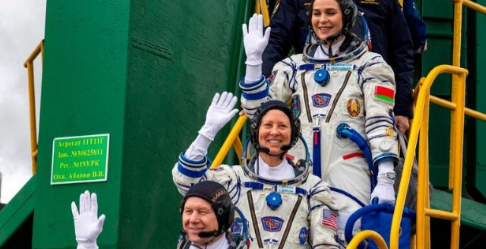
Russia called off the launch of three astronauts to the International Space Station just moments before liftoff on Thursday, but officials assured that the crew was unharmed.
Russia
The scheduled liftoff from the Russian-leased Baikonur launch facility in Kazakhstan was set to carry NASA astronaut Tracy Dyson, Oleg Novitsky of Roscosmos, and Marina Vasilevskaya of Belarus aboard the Russian Soyuz rocket.
However, approximately 20 seconds before the planned liftoff at 1321 GMT, an automatic safety system triggered an abort. Both Russia’s Roscosmos space corporation and NASA confirmed the crew’s safety. Roscosmos chief Yuri Borisov announced that the next launch attempt is scheduled for Saturday.
Borisov informed reporters that experts swiftly identified the cause of the launch abort, attributing it to a voltage drop in a power source.
The International Space Station, a symbol of post-Cold War international cooperation, remains one of the few areas of collaboration between Russia and the West amid heightened tensions over Moscow’s actions in Ukraine. NASA and its partners aim to maintain operations on the orbital outpost until 2030.
For Tracy Dyson, this would have marked her third journey to the space station, where she was slated to spend six months. Oleg Novitsky, embarking on his fourth flight to the orbiting outpost, and Marina Vasilevskaya, set for her inaugural space mission as Belarus’s first astronaut, were supposed to return to Earth after a 12-day orbit.
The trio was intended to join the station’s current crew, comprised of NASA astronauts Loral O’Hara, Matthew Dominick, Mike Barratt, and Jeanette Epps, along with Roscosmos cosmonauts Oleg Kononenko, Nikolai Chub, and Alexander Grebenkin.
Russia continues to rely on modified versions of Soviet-designed rockets for launching commercial satellites, as well as transporting crews and cargo to the space station.
Although the crew faced no imminent danger, Thursday’s aborted launch was a notable setback for the Russian space program. It came after an October 2018 launch failure, where a Soyuz rocket carrying NASA astronaut Nick Hague and Roscosmos’ Alexei Ovchinin malfunctioned less than two minutes after liftoff, necessitating an emergency landing.